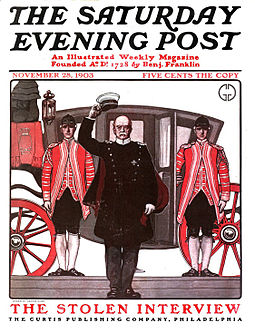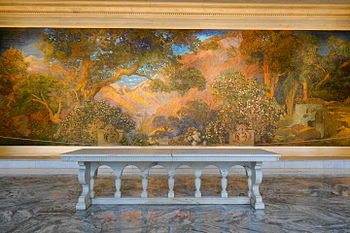Curtis Publishing Company

Saturday Evening Post, published by the Curtis Publishing Company, 1897-1969
|
|
| Industry | publishing |
|---|---|
| Founded | 1891 |
| Founder | Cyrus H. K. Curtis |
| Products | magazine |
| Services | advertising |
| Curtis Publishing Company | |
|---|---|

Dream Garden by Maxfield Parish and made by Louis Comfort Tiffany
|
|
| Location | Immediately SW of Independence Hall |
| Coordinates | 39°56′54″N 75°09′06″W / 39.9482°N 75.1518°W |
| Designated | November 30, 1998 |
The Curtis Publishing Company, founded in 1891 in Philadelphia, Pennsylvania, became one of the largest and most influential publishers in the United States during the early 20th century. The company's publications included the Ladies' Home Journal and The Saturday Evening Post, The American Home, Holiday, Jack & Jill, and Country Gentleman. In the 1940s, Curtis also had a comic book imprint, Novelty Press.
The Curtis Publishing Company was founded in 1891 by publisher Cyrus H. K. Curtis, who published the People's Ledger, a news magazine he had begun in Boston in 1872 and moved to Philadelphia in 1876. He had also established the Tribune and Farmer in 1879, from the women's section of which he fashioned the Ladies' Home Journal under the editorship of his wife, Louisa Knapp, in 1883. These publications were taken under the imprimatur of the new company. In 1897, Curtis spent $1,000 to buy Saturday Evening Post, which would become one of the nation's most popular periodicals, known for its timely articles and stories and frequent cover illustrations by Norman Rockwell.
The advent of television in the late 1940s and early 1950s eroded the popularity of general-interest periodicals like the Post and the Journal, and in March, 1962, Curtis Publishing's president Robert A. MacNeal announced that the company had lost money for the first time since its incorporation more than seven decades before.Perfect Film loaned the company $5 million in 1968 at the request of Curtis's primary loan holder, First National Bank of Boston, to extend its loans. Curtis sold its Philadelphia headquarters to real estate developer John W. Merriam for $7.3 million to pay off most of the First National loan; it then leased half of the building back.
...
Wikipedia
